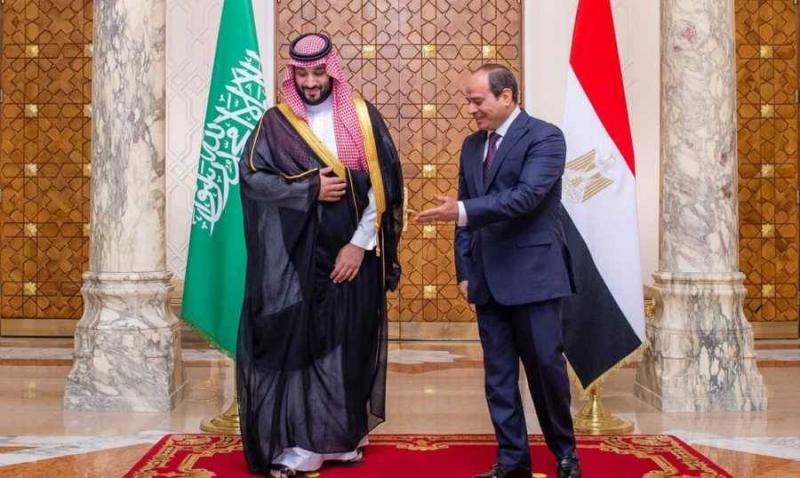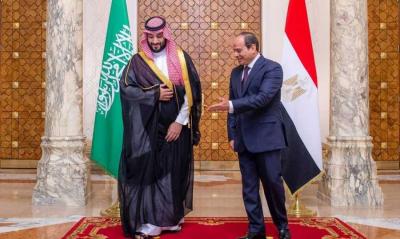Egypt and Saudi Arabia confirmed their determination to strengthen cooperation on all political issues and strive towards formulating common positions that ensure the security and stability of the two brotherly countries. They emphasized the importance of continued coordination and consultation regarding developments in all bilateral and multilateral forums, contributing to peace and prosperity in both countries and the region. This joint position was stated at the conclusion of Saudi Crown Prince Mohammed bin Salman's visit to Egypt on Tuesday, after which he left for Jordan, his next stop on a regional tour that also includes Turkey.
In Cairo, he stressed “the importance of continued coordination and consultation, and the exchange of viewpoints between Egypt and Saudi Arabia to address the challenges and crises facing the Arab nation, while standing against interventions in the internal affairs of Arab countries that aim to destabilize the region and its peoples,” according to the official spokesman for the Egyptian presidency.
Egyptian President Abdel Fattah El-Sisi welcomed Crown Prince Mohammed bin Salman at the Al-Ittihadiya Palace, where a ceremonial reception took place, including the playing of both national anthems. The spokesman stated that “President Sisi welcomed Prince Mohammed bin Salman as a distinguished guest in his second country, Egypt, conveying his regards to his brother, King Salman bin Abdulaziz, Custodian of the Two Holy Mosques, and wishing him continued health and wellness.”
Furthermore, he affirmed the commitment to continue enhancing consultation and coordination with his brothers, the King and Crown Prince, regarding various issues of mutual interest, as well as topics of bilateral cooperation, within the framework of the historical and strategic relations between Egypt and Saudi Arabia, which reflect shared political will and unity of destiny. Within this context, he praised “the significant qualitative development in Egyptian-Saudi relations across political, economic, security, and military fields, and the noticeable growth in trade exchange and investment volume, indicating the mutual desire to advance and deepen these relations.”
For his part, Crown Prince Mohammed bin Salman conveyed to President Sisi the greetings of his brother, the Saudi King, affirming that his current visit to Egypt aims to enhance the distinguished relations between the two brotherly countries and the continuation of regular and intensive consultation and coordination between Egypt and Saudi Arabia on regional issues of mutual interest. He expressed his anticipation that this visit would add further momentum to the strong and enduring ties that connect the two nations at both official and grassroots levels.
Moreover, the Saudi Crown Prince emphasized the importance of continued coordination and consultation between Egypt and Saudi Arabia to confront the challenges and crises facing the Arab nation, praising Egypt's pivotal role as a fundamental pillar for security and stability in the region.
Regarding bilateral relations, the spokesman noted that “the meeting discussed ways to enhance various aspects of bilateral relations, particularly in the economic and investment arenas, and the initiation of more joint projects in light of promising investment opportunities available to both sides, as well as the optimal exploitation of all available fields to enhance integration between them.”
The meeting also addressed several prominent issues in the international and regional arenas, reflecting a mutual understanding of the need to continue joint efforts to address the risks threatening the security and stability of the region’s countries and peoples. President Sisi stressed Egypt's position on Gulf security as an extension of Egyptian national security and rejected any practices that aim to destabilize it.
Both sides agreed on the importance of the upcoming summit to be hosted by Saudi Arabia among the leaders of the Gulf Cooperation Council and Egypt, Jordan, Iraq, and the United States. At the end of Crown Prince Mohammed bin Salman’s visit to Egypt, the Egyptian presidency issued a “joint closing statement,” which highlighted that “a formal discussion session took place between President Sisi and Crown Prince Mohammed bin Salman in an atmosphere of friendship and brotherhood, embodying the depth of the strong and historical relations between the two brotherly countries.”
They discussed the historical ties between the two nations and lauded the level of cooperation and coordination on all fronts, examining ways to develop and enhance relations in various fields to bolster the interests of both countries and their peoples. They addressed the current regional and global developments and affirmed their mutual positions and shared destiny concerning various issues and developments of common interest.
In the economic and commercial domain, both sides agreed to enhance the economic partnerships investment-wise and commercially between the two brotherly countries, aiming to elevate these ties to broader horizons that reflect the strength of their historical and strategic relationship by achieving integration between the available opportunities through Saudi Arabia’s Vision 2030 and Egypt’s Vision 2030. They affirmed their commitment to increase the pace of investment cooperation and trade exchange, motivating partnerships between the private sectors of both countries while working to create a fertile and inviting investment environment that supports several targeted sectors, including tourism, energy, healthcare, transport, logistics, communications and information technology, real estate development, and agriculture.
Both countries welcomed the announcement of significant investment and commercial agreements between their private sectors amounting to 30 billion Saudi Riyals (approximately 145 billion Egyptian pounds) during the visit of Crown Prince Mohammed bin Salman, along with the announcement of Saudi Arabia’s intention to invest 30 billion US dollars in Egypt.
Additionally, they announced cooperation in the field of renewable energy generation through a 10-gigawatt electricity project to be implemented by ACWA Power. They praised the volume of trade between the two nations, reflecting the depth and sustainability of their economic relations. Both sides agreed to continue coordination and cooperation in marine environmental protection and to enhance trade between the two countries, especially concerning agricultural products, according to the agreed regulations.
Saudi Arabia praised Egypt's economic reforms and both parties expressed their desire to broaden their economic cooperation aimed at achieving stability and economic prosperity for both peoples and enhancing their ability to overcome challenges posed by recent global crises. They reiterated their intention to conclude negotiations on the investment protection and encouragement agreement and to sign and ratify it by both parties as part of their shared commitment to provide a secure investment environment and attractive legal frameworks.
In the context of climate and environmental challenges, both parties agreed to establish a summit for the Green Middle East Initiative and the Saudi Green Initiative Forum during the United Nations Climate Change Conference (COP27) hosted by Egypt. They also affirmed their cooperation in health, education, tourism, and culture.
On the political front, both parties expressed their intent to reinforce cooperation on all political issues and to formulate common positions that ensure the security and stability of the two brotherly countries. They underscored the significance of continuous coordination and consultation regarding developments in all bilateral and multilateral forums, contributing to achieving peace and prosperity in both countries and the region.
The statement indicated that “the two sides reviewed regional and international issues of mutual interest, particularly the Palestinian issue, stressing the necessity of intensifying efforts for a comprehensive and just settlement of the Israeli-Palestinian conflict and establishing a real horizon for resuming serious and effective negotiations to achieve peace based on the two-state solution, relevant international legitimacy resolutions, and the Arab Peace Initiative, ensuring the Palestinian people their right to establish an independent state on the 1967 borders with East Jerusalem as its capital.”
On the Yemeni issue, they renewed their full support for the UN and regional efforts aiming for a comprehensive political solution to the crisis in Yemen, based on the Gulf Initiative and its executive mechanisms, the outcomes of the Yemeni National Dialogue, and UN Security Council Resolution (2216). The Egyptian side praised Saudi Arabia's efforts and numerous initiatives aimed at encouraging dialogue and reconciliation among Yemeni parties to end the war in Yemen, as well as its role in facilitating humanitarian aid to all regions of Yemen. They reaffirmed their support for the Presidential Leadership Council and supporting entities to enable it to perform its tasks in implementing effective policies and initiatives aimed at achieving security and stability in Yemen.
They also expressed their support for the UN truce in Yemen and welcomed its extension announcement. The Saudi side appreciated Egypt's response to the request of the legitimate Yemeni government and the United Nations to operate direct flights between Cairo and Sanaa to support the truce and alleviate the humanitarian suffering of the Yemeni people caused by the Houthi terrorist militia, stressing their condemnation of Houthi terrorist attacks on civilian objects and vital facilities in Saudi Arabia, and their threats to the security and safety of international maritime corridors.
Regarding Iraq, both sides expressed their hope for the Iraqi parties to reach an agreement that forms an inclusive government working to meet the aspirations of the Iraqi people for security, stability, development, and countering terrorist organizations, and to advance Iraq's relations with its Arab brethren towards broader horizons in light of the bonds of brotherhood and common objectives uniting Arab peoples.
On the Sudanese situation, they reaffirmed their ongoing support for the transitional phase's success and emphasized the importance of dialogue among all Sudanese parties to help preserve political and economic gains and achieve unity among all segments of the Sudanese people.
On the Syrian issue, they highlighted the importance of reaching a political solution to the Syrian crisis that fulfills the aspirations of the Syrian people and preserves Syria's unity and territorial integrity. They also emphasized the need to stop regional interventions in Syrian affairs that threaten Syria's security, stability, and social fabric integrity, supporting the efforts of the UN Special Envoy for Syria.




